The articles “How to Compose a Resume” were partly useful, and partly confused and created fear: their authors claimed that my letter could go into the basket if the structure was not maintained or the responsible officer did not see keywords in it for the first 5 seconds of reading.
Years passed, now I myself am involved in hiring front-end developers and looking through resumes with other team leaders.
In this article I want to tell:
- What points we pay attention to before inviting a candidate for an interview, and how it is profitable to present our experience.
- Which, contrary to popular myths about job search, on the contrary, does not affect the decision of the employer.
- What if the current experience is objectively not enough for the dream position.
And most importantly - I want to explain the logic that we follow so that the process no longer looks like magic.
Do not take what is written as a universal recipe or requirements. Rather, it is friendly advice and a side view. You may not have a resume at all, if you are a top developer, a conference star, you have a cool profile on GitHub, a friend recommends you, and so on. This article is for beginners and those who are first faced with a job search.
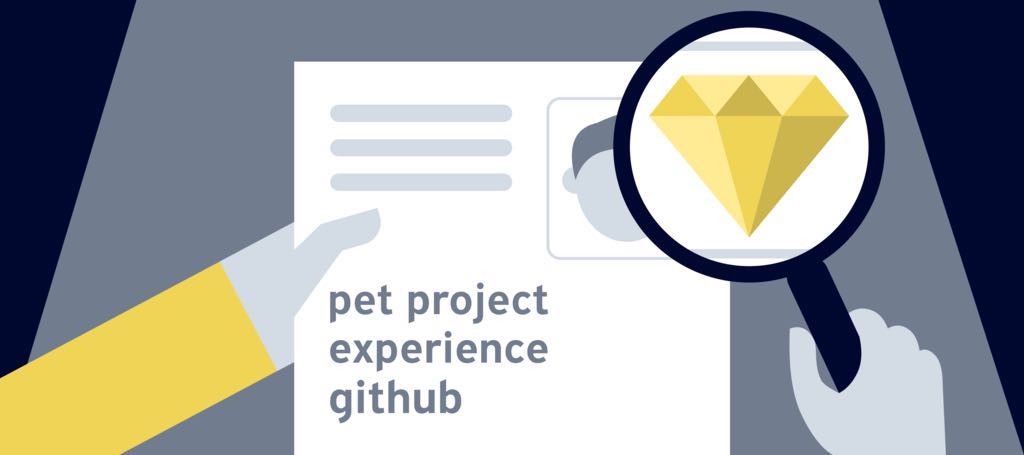
Resume structure
A standard resume consists of the following blocks:
- Name, contact details, desired position (optional - age);
- experience;
- education;
- additional information that you want to communicate.
To ruin the part relating to the name and the desired position, you need to try hard. Therefore, we turn right to the second block.
experience
Obviously, this is the most important section of the resume (the exception is specialists with no experience, tips for them below). Based on this information, we evaluate whether the candidate is suitable or not suitable for our team. There are several ways to describe your experience, we will consider each of them.
Option 1. Minimalistic
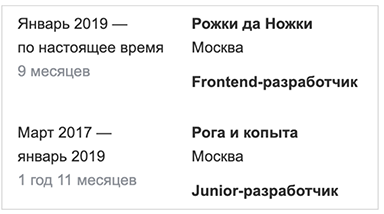
From such a summary, we found out that the candidate was a front-end developer. But how? What kind of framework did he use? Did you write tests? What tasks did you have to solve?
It’s good if Horns and Legs is a well-known IT company. Say, if you worked at Google, then, in principle, you can write nothing more, many employers “peck” at this. Otherwise, provide more information.
Of course, there is an option to call such a candidate for an interview and find out everything personally or ask colleagues from HR to contact and find out more. But by giving yourself such a mystery, you increase the chance that your potential lead will think of everything himself and not all his guesses will be in your favor.
Option 2. Indication of technology

By specifying the technologies that you own, you immediately removed a lot of questions. Now we understand how your skills overlap with our stack. Only without fanaticism, it is not necessary to list the technologies of all neighboring departments. Too long a list looks implausible. Indicate what you personally worked with and what you are ready to discuss in the interview.
Do not be afraid of incomplete stack matching. For example, you worked with NGXS, we work with NgRx. Knowledge of related technologies will still be a plus. And the more your experience is similar to our projects, the more likely that we will want to get to know you.
But still I would like to know what specific tasks you have been solving.
Option 3. Indication of responsibilities
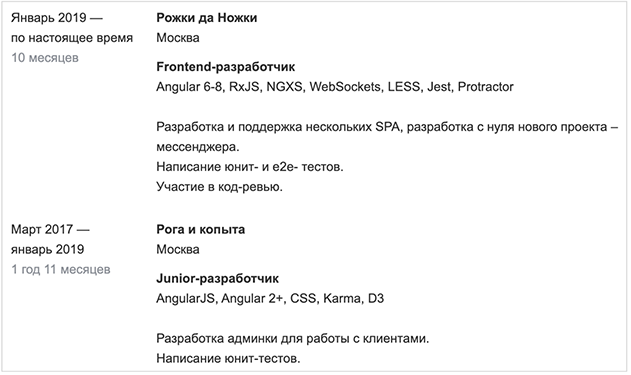
Now we better imagine what you did at your last job, and we can compare this with open positions. If you did something similar, this will add a plus sign to your imaginary karma. But even if the tasks were very different from our projects, a description of the previous responsibilities will help to make at least an initial idea of you and become the starting point for an in-person interview.
I can confidently say that a candidate with such a resume will receive more invitations to an interview. But is it possible to do even better? It turns out yes.
Option 4. Showing achievements
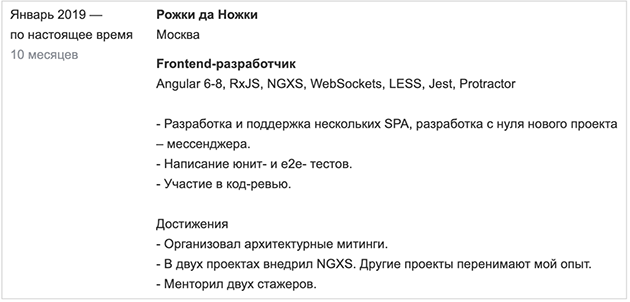
Well, now we know not only what you were doing , but also what you really did . This is especially important if you are senior or team leader. From employees in such positions, we always expect a decisive contribution to the technical development of the project or team management. But less experienced developers often have something to share.
I admit that, changing my work for the first time, I was embarrassed to describe my achievements: so what, that I spend statuses, evaluate deadlines and supervise a less experienced colleague, because officially I am still a “junior programmer”! Now I can authoritatively declare that you don’t need to be shy: you have done something important - write about it, even (and even more so) if it does not correspond to your current position.
Doubt what to consider achievements? Here are some ideas:
- introduced TypeScript (ES6, unit tests, code review, code style, etc.);
- optimized site loading;
- formed a team, consciously chose a framework;
- organized internal training (meetings, trips to external conferences);
- spoke at the meeting, conference.
This list goes on. But I will give one more advice. Remember the parable about the three screens through which you want to pass what you want to say? So, achievements should be passed through an adequacy sieve.
For example, you write that you manage the front-end development department. And then it turns out that the department consists of you and your friend Petit. It looks so-so. Or, cite insignificant facts: during the work I wrote 30 thousand lines of code, closed 125 tickets, and reviewed 1,500 pull requests.
If we look at the distribution of the last resume we received in the indicated categories, we will see the following picture:
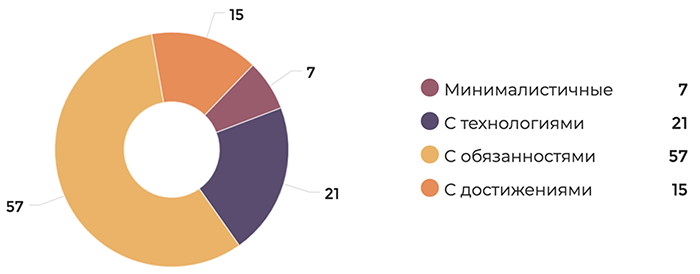
At least 28 out of 100 resumes could be significantly improved.
I want to note that a poorly prepared resume does not always mean a less suitable candidate, and vice versa: the author of an excellent resume may not go through a technical interview or work with the team. But if you don’t even try to tell about yourself, how will your potential colleagues see you among other candidates?
Problems indicating experience
Sometimes a person has enough years of experience, but reading the resume, we still think that this is “not our candidate”. What could be wrong?
Frequent job change
It seems that everyone already knows that a frequent change of work does not color the applicant. For me, a frequent change of work - three or more places where you worked less than a year. This is not an unconditional basis for refusal, especially if the reasons were neutral. For example, you worked on a project and it was completed. This can be immediately indicated in the resume so that the potential lead does not think of himself.
Nevertheless, I propose to think about it, changing work the next time: is your new place better than the old one, are there prospects and opportunities for growth, does it make you closer to your global career goals? And do you have them?
Experience in irrelevant technology
It happens that a candidate has a long history, but even many years of experience and well-described experience may not be relevant to the position.
We are looking for Angular and React developers (but we are often ready to consider developers with experience in other frameworks), and in the resume, for example, only WordPress blogs. Or you developed a backend, and now you want to retrain in front-end. I myself was in such a situation several years ago and I understand what problems await you: there is development experience, but there is no practical experience in web development. Interviewing in a new specialty can be difficult.
What to do? Raise the legs up and reconcile? Continue to do what you have already stopped loving? Of course not. We proceed to the next section.
And if there is little experience?
Good developers are always lacking. And interviewers are also people and also once started from scratch. Therefore, they are often ready to consider candidates, albeit with insufficient experience, but with a desire to grow. You just need to reinforce this desire with deed and transparently hint about it in the resume.
Self development
If you lack knowledge of related or more advanced technologies, start learning them yourself. Take video courses, now there are many for every taste (I love Pluralsight , but you can find free videos of great quality). Write about the desired development path and your efforts in a resume - for example, in the "Additional Information" section or in a cover letter. For example:
At the current place of work, we do not use frameworks, but I follow modern technologies and study Angular (React, Vue - here we focus on our interests and the desired place of work). Passed such and such courses.
And again without fanaticism! If you specify 50 courses, starting from layout and ending with optimizing database queries, this looks strange (unless you are fullstack). Think about what you really want to do and what you are missing right now.
By the way, if you are going to look for work, because you are not satisfied with outdated technologies or the lack of good team practices, I suggest you think for a moment: have you tried to change this? If not, I recommend you try. Unexpectedly, this may turn out to be an opportunity for growth, and a way to gain practical experience in real working conditions.
Pet-project
Suppose you are undergoing or have already completed some training: have looked at courses, read a book or articles. You, of course, understand that such a “theoretical” preparation is not enough. I always advise to develop new knowledge in practice as you watch a video or read a book. For example, start a pet project.
What could it be? In principle, anything.
Do you like football? Make a website about the upcoming championship. Learning a foreign language? Write an application for repeating words. Do you like to travel? Make a map of the places where you were. There are many open APIs whose data can be used. For example, you can find a good list of APIs in the repository of public-APIs .
In addition to consolidating the studied material, the pet project provides another interesting opportunity: it can be posted on GitHub and provide a link to your profile in the resume. A good code will say more than a thousand words about you, and in some cases will save you from a test task. But make sure your github is not against you.
Your profile on github
Several times I came across resumes, the author of which indicated a link to GitHub (which in itself is very healthy and highlights the resume in the eyes of potential interviewers), but viewing the code completely discouraged the desire to communicate. Here are the simplest reasons why this might happen:
- A lot of code in one file, huge functions, big nesting.
- Obvious code duplication.
- Frankly bad names of variables and functions.
- Unused variables, functions, imports.
And these are only those code smells that immediately catch my eye, even before I spool the code. By the way, it’s very convenient if your project is deployed somewhere and you can watch the demo without starting it at home. The simplest option is github pages .
Of course, your right to store in your repositories the code that you sketched on your knee, the code that you wrote a long time ago and now you would have done everything differently, code without tests and without types.
But remember that if you yourself gave a link to your GitHub, then for the interviewer this is an invitation to evaluate it and draw a conclusion. Therefore, my advice: put the code in order so that it shows the best practices that you know. At least for one project, which you will demonstrate as a standard.
Resources for practice
Pet-project - a story about creating a project from scratch, working with a framework, with an API. In general, this is something reminiscent of a real project in miniature. In addition to working on a pet project, I advise you to practice solving problems for writing code. This is especially important for junior developers or developers changing their specialization (for example, when switching from C # to javascript) - this is how you can get your hand in and get used to new designs.
There are many sites with suitable tasks and an automatic verification system. My favorites are Codewars and LeetCode .
In general, this advice is more about self-development and preparation for an interview than writing a resume.
Education
Everything is simple with education: either it exists or it does not exist, we simply write the truth. If you have undergone additional training directly or indirectly related to work, it is also worth mentioning this. In my case, this is, for example, a UX&UI Design course at the British Higher School of Design.
Recently I was asked how important it is, in principle, to have a university degree to work in IT.
I think this is a hollow question, even some colleagues may disagree with me. My answer is: if there is an opportunity to finish a good university - it is better to do it. But the availability of education is not a decisive factor (but knowledge is yes). And certainly I do not advise anyone to enter a little-known institute just for the sake of crust.
I admit, mentally I put an additional plus sign for candidates with a specialized education
in top universities. Nevertheless, I know some excellent developers without higher education, and the lack of a diploma does not bother them.
Additional Information
Many resumes end with a block with additional information about the candidate. Here you can specify everything that is not suitable for other sections in format. For example:
- what you are interested in and in which direction you want to develop (you can write that UX is especially important for you or that you like to mentor less experienced colleagues);
- Link to GitHub or portfolio
- talk about your articles or speeches;
- explain that even though you don’t have experience in a certain technology, you are ready to master it and do something for this (see the section “And if there is little experience?”);
- talk about any other achievements (in the olympiad programming, solving business cases, etc.).
You ask: “What about the standard wording“ stress-resistant ”,“ easy to train ”and similar definitions that can still be seen in the resume examples?” They do not make any impression on me, and I sincerely do not understand why they are still used . In the end, we do not assume by default that candidates are particularly stressed, and we try to avoid uncomfortable situations in the team.
conclusions
In conclusion, I will give a few ideas that I wanted to convey with this article:
- In a summary, describe in detail your experience: indicate the technologies, main tasks and your achievements, if any.
- If experience is not enough - study for yourself and show it to the potential employer.
- For practice, get a pet project.
- Publish it on GitHub to show an example of the code you are writing.
- If you specify GitHub in the resume, bring the code to perfection.